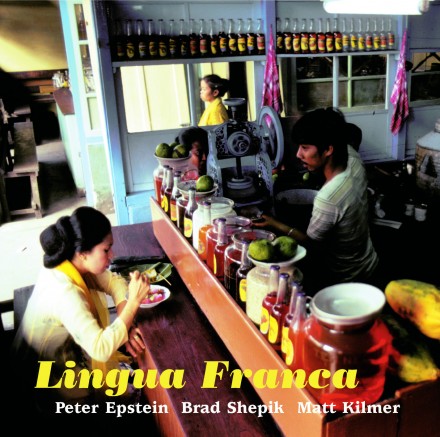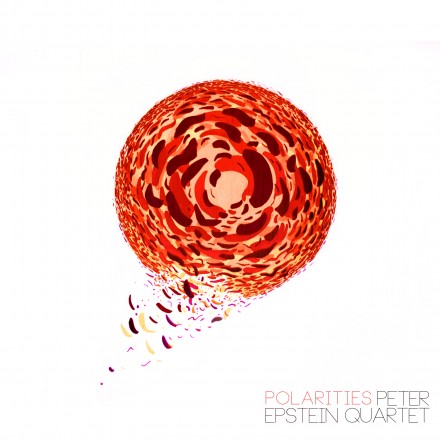Peter Epstein / Brad Shepik / Matt Kilmer
Lingua Franca
SGL SA1555-2“…Epstein is making some pretty amazing statements rooted in world music and the avant-garde, but stretching even those parameters to create a contemporary modern sound all his own.”
—All Music Guide
Peter Epstein and Brad Shepik have been friends and musical collaborators for at least a decade. Both became well established on the NY scene — Brad as one of the most intense and committed guitarists, at home playing in, out and onthe edge, a lynchpin in several world music influenced jazz ensembles (Dave Douglas’s Tiny Bell Trio, Matt Darriau’s Paradox Trio, Pachora); Peter as an equally versatile saxman, a superb composer-performer with interests ranging from improv to Bach to Balkan, Indian and west African music. Peter was an essential part of Brad’s middle-eastern inspired quintet that recorded The Loan (1997) and The Well (2000) for Songlines. Then he moved away from NY, did his Masters of Music at the University of Nevada, Reno (where he is now Director of Jazz Studies), and the two had few opportunities to perform together. So Peter proposed a new, duo collaboration, with both of them contributing pieces. Brad suggested bringing in Matt Kilmer, a young NY-based percussionist he’d performed with in Paradox Trio and Simon Shaheen’s group. Songlines arranged to record the trio in great-sounding analog.
The result is even more diverse than their previous work together, as it alternates between different grooves and a more meditative, timeless, often folky feel. The individual elements that make up the music are sometimes clear (e.g. the reggae tune “Sunrise,” the bluesy Miro,” the Celtic Emerald”), but more often effortlessly and elegantly combined (e.g. Monsaraz’s eastern modality plus its 12-bar blues-influenced form and chord progression) to the extent that it becomes hard to say exactly what’s what. Brad comments: “In terms of musical style I’m not able to dissect the influences in a definitive way, but I was looking for material that we could have some fun with as a group. We also wanted to do some free improvisations.” Peter adds: “Playing with Brad has always felt extremely easy and natural…I wanted to do a project where we could also include sounds more associated with America: jazz, blues…So there’s a bit of leaping around from reference to reference, but that’s almost on purpose; what’s of real interest here for me is the way in which we can play these very disparate sounds in the creation of an album where the commitment and communication within the group tempers those differences, by establishing a group sound / concept that remains consistent and personal throughout.”
The title was Peter’s idea: “For me Lingua Franca refers less to a concept involving the overlapping of various musical cultures and has more to do with overlapping musicians and personal musical concepts, with each musician representing a distinct musical culture unto themselves. Another level of meaning: this project involves multiple musical languages in the sense that it is neither a world music album nor a jazz album exclusively. It’s one thing to make a hybrid of different styles or genres, it’s yet another to create a whole album where even different forms of hybrids can coexist.” So what makes it a jazz record? Brad: “For me the jazz element is in the improvising and in the way the trio shapes the music collectively from moment to moment.” Peter: “For me, more and more, it’s all becoming the same thing. That’s a very personal statement, however. I wouldn’t be so quick to claim that it is so for the whole jazz world though there does seem to be continued momentum in that direction. In a way, I suppose I am my own melting pot. All of these different sounds and concepts have gone in but what comes out is something unlike any of the original sounds. That’s not to say that I have ended up with one way of playing. Perhaps one way of saying it is that being a ’jazz musician’ now means that we can (without significantly raising eyebrows) call a Balkan tune, free improvisation or an original the way we used to call a waltz, ballad, or bebop tune (even alongside the waltz, ballad, or bebop tune).”
For more information: mattkilmer.com

